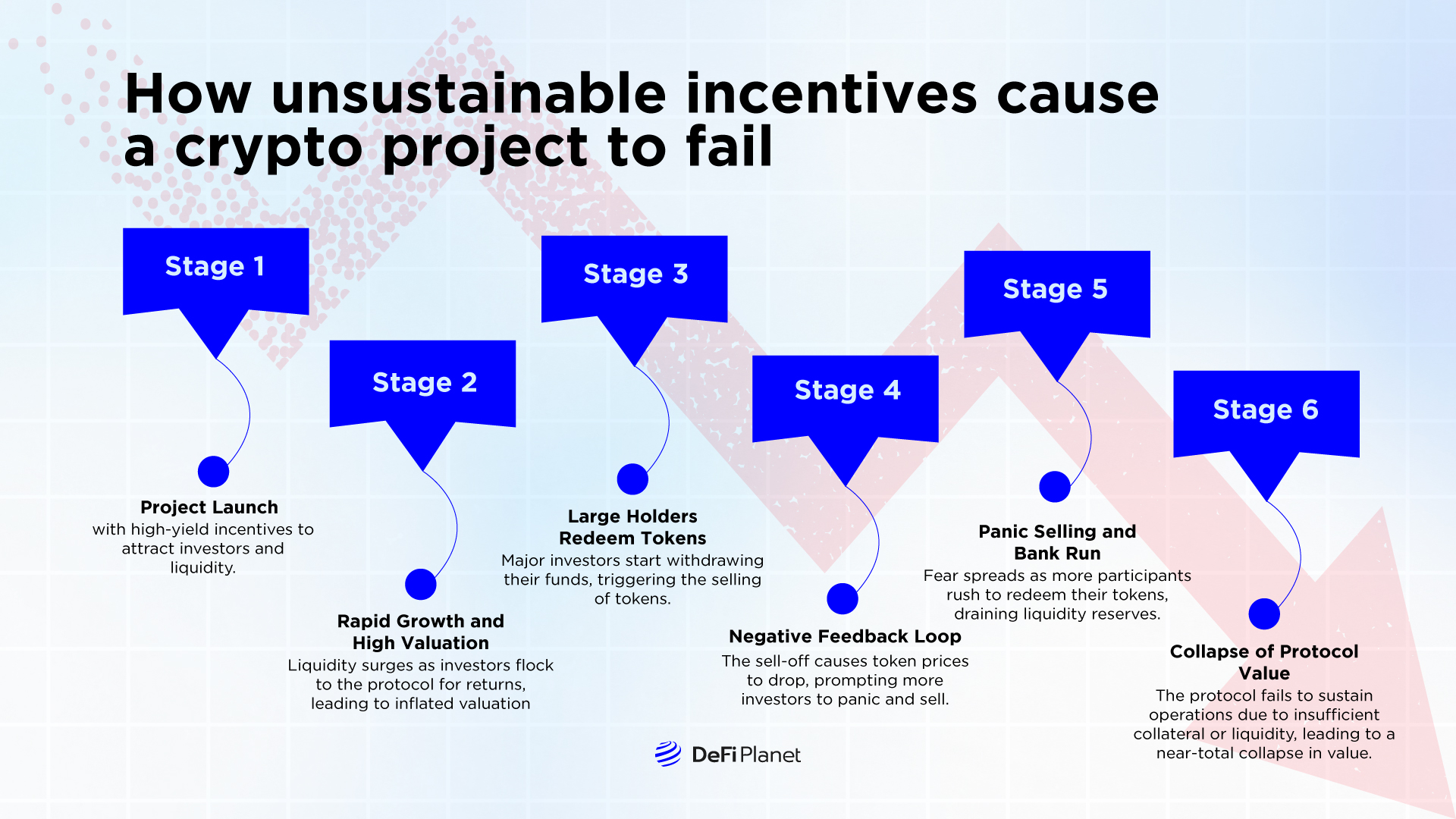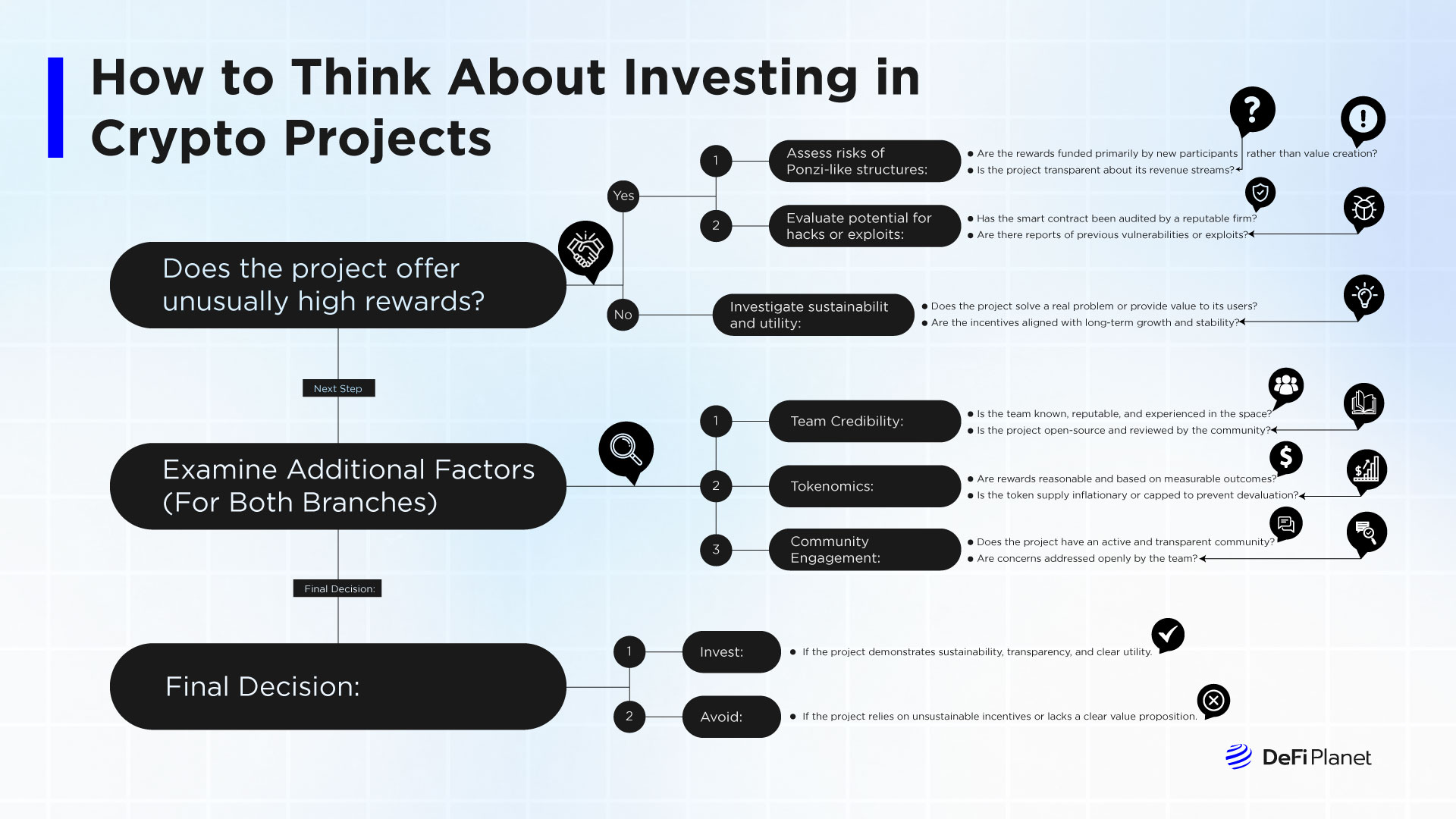Last updated on May 5th, 2025 at 11:50 am
DeFi’s biggest appeal currently comes from its reward structures, which, as of 2024, have attracted billions of investors’ dollars due to the promise of high returns over short periods.
Incentive structures such as high-yield farming and staking rewards have become a common feature of the crypto landscape, especially because they encourage participation by allowing users to earn passive income and opportunities to maximise gains quickly.
However, these systems can inadvertently foster fraud and unsustainable projects. Projects offering excessively high returns risk becoming Ponzi schemes, where early investors benefit at the expense of later ones. A notable example is Iron Finance’s collapse in June 2021, when a stablecoin peg failure led to a $2 billion loss for investors.
The Problem with Overly Attractive Incentives
While high rewards create an illusion of opportunity and drive rapid growth and investor interest in the short term, this often comes at the expense of long-term sustainability. Projects focused on extraordinary returns to attract participants are often set up for failure. The allure of high yields leads to speculative behaviour and unsustainable financial models.
As we examine the pitfalls of these incentive structures, it becomes clear that while they may boost liquidity and initial interest, they frequently fail to support long-term project health.
The Focus on Short-Term Gains Instead of Long-Term Sustainability
Projects offering high rewards often attract liquidity and give the impression of robust growth. However, this influx of liquidity is often unsustainable, leading to eventual collapse when new funds stop flowing in.
A classic example is the Iron Finance collapse mentioned earlier. The project initially attracted a surge of liquidity with promises of exceptionally high returns. Investors flocked to capitalize on these rewards, believing they had found a lucrative opportunity in the project’s stablecoin ecosystem. However, the rewards relied heavily on new liquidity inflows rather than on substantial value creation.
When the liquidity dried up, Iron Finance experienced what is often called a “bank run.” Investors scrambled to withdraw their funds, resulting in a catastrophic collapse that wiped out nearly $2 billion in value overnight. This highlights a critical issue: these reward structures can create unsustainable booms that inevitably lead to busts, leaving investors in financial ruin.
In addition, projects that focus heavily on short-term incentives can distort their long-term goals. Instead of prioritizing sustainable development, they shift toward appeasing early participants. This creates a vicious cycle, where rewards are continually raised to maintain investor interest, leading to bubbles that inevitably burst. When a project promises rewards that far outpace market averages, it often signals that returns are being subsidised by newly introduced liquidity rather than true value generation.
A similar issue occurred with SushiSwap, which faced liquidity provider withdrawals as rewards decreased, showing how short-term incentives can erode a project’s foundation.

It Encourages Fraud and Ponzi Schemes
Overly attractive incentives often disguise fraudulent schemes, particularly those resembling Ponzi structures. These schemes appear to thrive as long as new funds keep flowing in, but they are built on shaky foundations. When new participants slow down, the structure collapses.
Bitconnect is perhaps the most notorious example of a Ponzi-like scheme in the crypto space. At its height, the platform promised returns of over 40% per month to users who lent out their Bitcoin on the platform. This unbelievable rate of return attracted a huge number of investors, many of whom were unaware that the deposits of new participants were funding their returns. When it became impossible to sustain these payouts, the platform collapsed in 2018, causing massive financial losses.
Ponzi-like structures flourish in the crypto space due to the speculative nature of the market. The fear of missing out (FOMO) and hype often drive investors into these schemes without clearly understanding the risks involved. When new participants can no longer prop up the structure, the project collapses, leaving those who invested too late to suffer significant losses.
This issue is compounded by crypto’s decentralized nature, where accountability is often unclear, and legal repercussions for fraud can be difficult to enforce. Developers can design these schemes to fail, walking away with the profits and leaving users with little recourse. This, in the long run, tarnishes the credibility of the entire crypto ecosystem because it makes it difficult for legitimate projects to build trust. A prominent example is the collapse of the Compounder DeFi project in 2020, where developers introduced a backdoor in the code, allowing them to drain users’ funds after investors poured millions into yield farming.
The Exposure to Hacks and Ethical Dilemmas
While many developers genuinely aim to build innovative and valuable projects, the drive for high rewards can lead to ethical lapses and critical security vulnerabilities. High rewards attract not only investors but also hackers and malicious actors seeking to exploit weaknesses in a project’s code or protocol.
Smart contracts, which are the backbone of many DeFi projects, are not infallible. These automated contracts execute transactions without the need for intermediaries, but they can also be prone to bugs and vulnerabilities if not thoroughly tested. When these flaws are found, they often relate directly to the very mechanisms designed to reward users. For example, Harvest Finance, a high-yield farming project, attracted significant attention with its promise of high returns. However, in 2020, it was exploited through a flash loan attack that drained $34 million from the platform. The vulnerability existed because of flaws in the reward structure, which bad actors were able to manipulate.
Similarly, in 2021, the Poly Network was hacked due to weaknesses in its protocol design. The hacker exploited these vulnerabilities to steal over $600 million. Although the funds were later returned, the incident highlighted how susceptible DeFi projects are to attack when their incentive mechanisms are poorly implemented.
From an ethical standpoint, developers face a dilemma: should they offer massive rewards to attract users quickly, or should they prioritize the security and sustainability of their projects? Unfortunately, in many cases, the lure of quick profits overshadows the need for long-term stability. Developers who prioritize high incentives without proper safeguards put not only their projects but also their users at risk.
Sustainable Alternatives to High-Risk Incentives
To foster long-term growth in the crypto space, developers and participants must prioritize sustainability over short-term gains. Instead of promising sky-high yields, projects should focus on realistic rewards and utility-driven tokenomics, as seen with Aave and Uniswap.
Time-locked vesting schedules, like those used by Curve Finance, can further stabilize ecosystems by curbing speculative liquidity outflows. Transparent audits, regular updates, and community engagement—as practised by Yearn Finance—are crucial to maintaining trust.
Ethical considerations should be at the forefront when designing incentive structures. Unsustainable reward systems can create a sense of urgency among participants, leading them to act recklessly without fully understanding the risks. Project creators should aim to foster a balanced ecosystem that rewards users fairly while ensuring the long-term viability of the platform. This includes being transparent about the risks involved and setting realistic expectations for returns.
On the side of investors and participants, promoting due diligence, transparency, and educational initiatives will help build a resilient community. Investors should seek verified and clear information so they can make informed decisions. Investors must avoid the temptation of unsustainable returns and thoroughly understand the projects they invest in.

Rethinking the DeFi Paradigm
The dangers of aggressive crypto incentives are undeniable—they foster a landscape that rewards unsustainable projects, invites fraud, and encourages exploitation. But this doesn’t have to be the future of decentralized finance (DeFi). As participants and contributors to this ecosystem, we must reconsider the foundations upon which growth is built. Are we fueling a speculative frenzy, or are we creating a future that fosters security, transparency, and long-term value?
It’s time to move beyond the short-sighted pursuit of quick profits. The industry must shift its focus from token-based hype cycles to the creation of durable, transparent projects that prioritize trust and integrity. Not every DeFi project needs a token to succeed. Developers should question the need to incentivize reckless speculation and instead design systems that are secure, stable, and driven by true value creation.
Investors, too, have a critical role to play. Rather than chasing unsustainable returns, they must take the time to understand the risks and long-term viability of the projects they support. This shift in mentality is crucial for the future of the sector.
Leading projects like Aave and Uniswap, which prioritize transparency, security, and utility-driven incentives, offer a blueprint for what a healthier DeFi ecosystem can look like. They serve as examples of how decentralized finance can evolve from its speculative roots into a robust, fraud-resistant financial system.
The future of DeFi hinges on a collective decision: Do we continue down the path of unsustainable growth, or do we prioritize education, security, and long-term viability? By shifting our focus, we can help shape a decentralized financial system that benefits everyone, rather than just the lucky few. It’s time for the entire ecosystem to rethink its approach—because the success of DeFi depends on it.
Disclaimer: This article is intended solely for informational purposes and should not be considered trading or investment advice. Nothing herein should be construed as financial, legal, or tax advice. Trading or investing in cryptocurrencies carries a considerable risk of financial loss. Always conduct due diligence.
If you would like to read more market analyses like this, visit DeFi Planet and follow us on Twitter, LinkedIn, Facebook, Instagram, and CoinMarketCap Community. “Take control of your crypto portfolio with MARKETS PRO, DeFi Planet’s suite of analytics tools.”





















